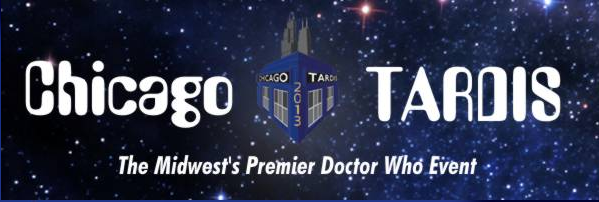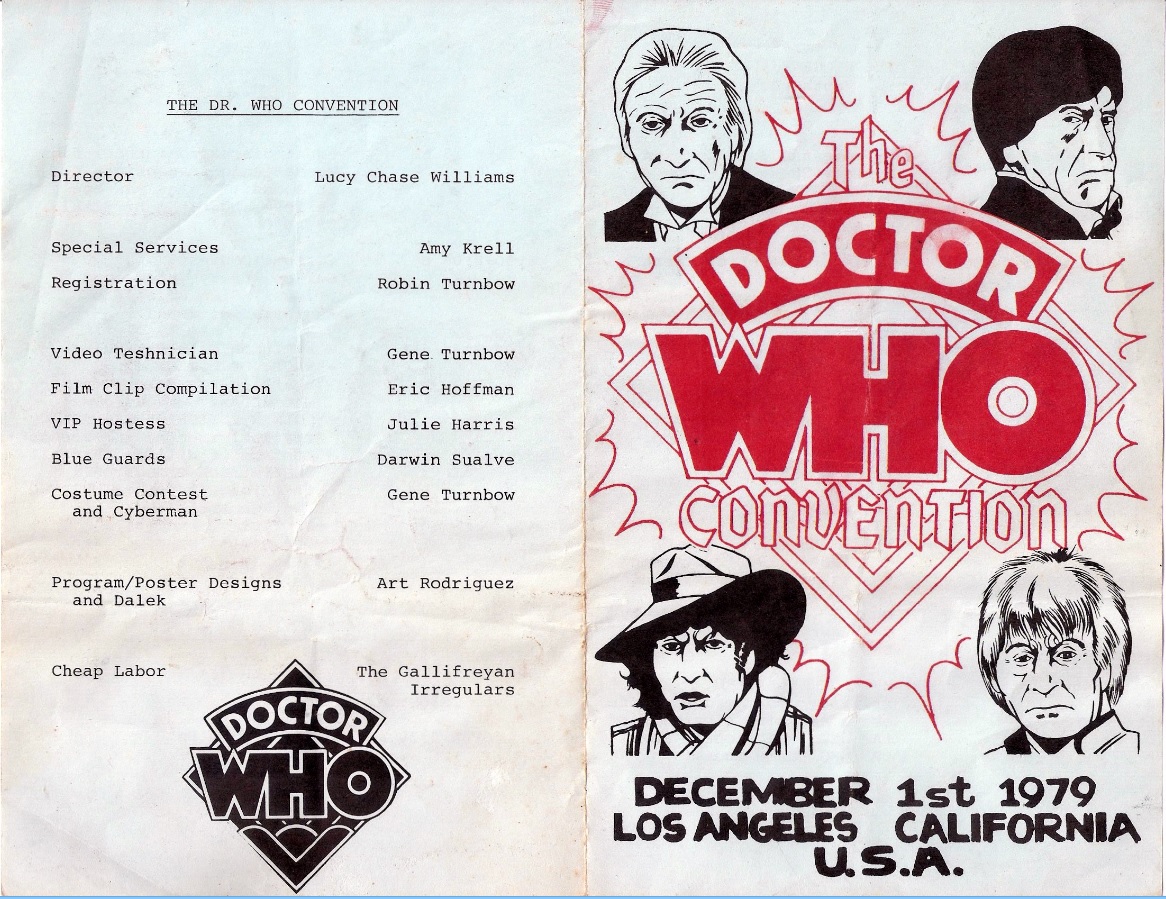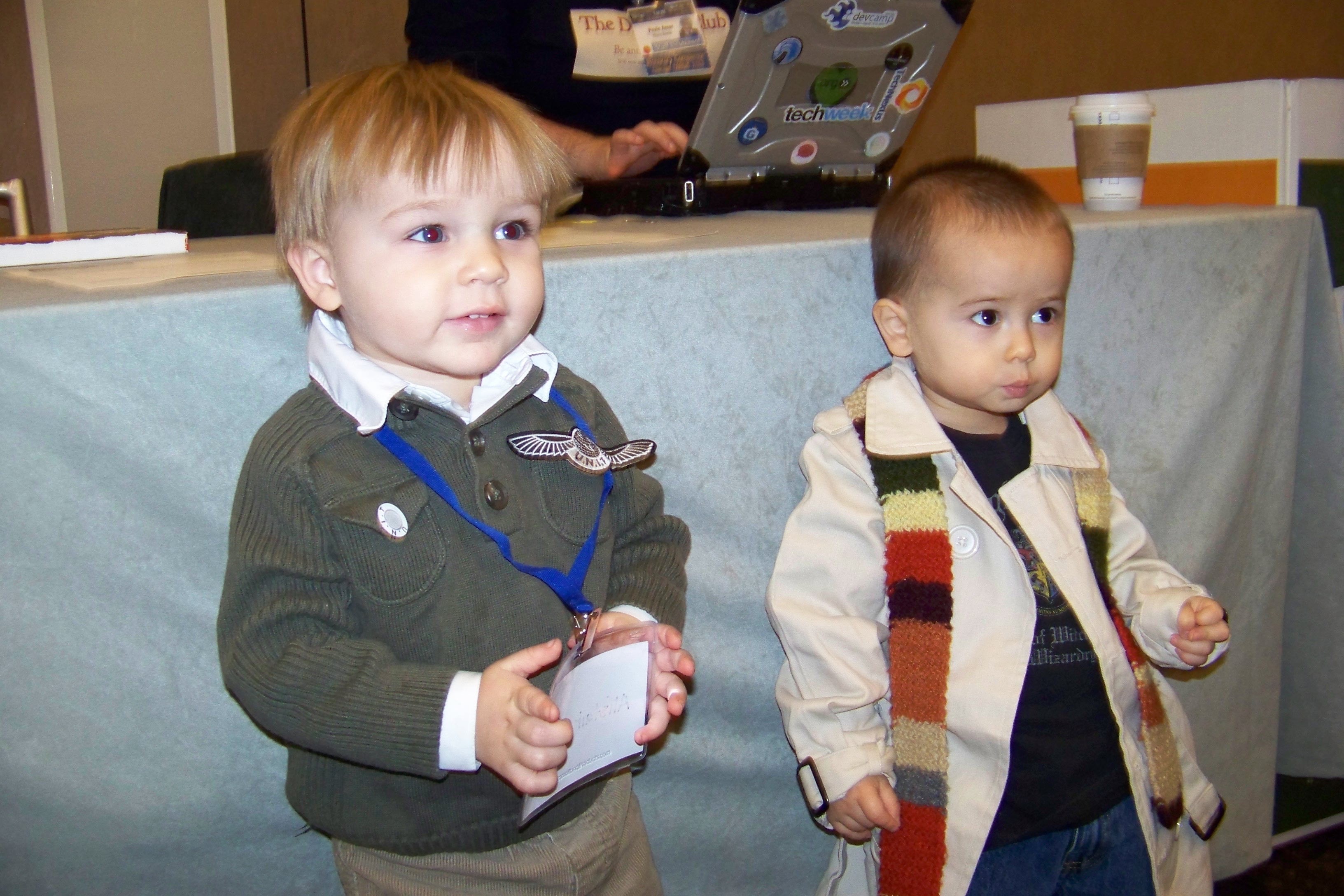The Cultural Lives of Doctor Who: Celebrations, Conferences, Conventions
Like many television programs with a strong fan base, Doctor Who has thrived not just on the television screen, but also through celebratory fan conventions. For fans in 2013, Doctor Who’s fiftieth anniversary celebrations arrived with pomp and circumstance, fanfare and flourish: This year, celebrations have been de rigueur.
For Doctor Who the fiftieth anniversary, as Matt Hills has described, is not just a way of marking a milestone for the television series, but also an “epic collision between fandom and brand management.” This collision can be seen not just in the way the BBC releases minisodes to appeal to fans in a fashion that Hills has called “trans-transmedia,” but also in the many in-person celebrations being held at the anniversary. These celebrations have taken many guises: from professionally-run, BBC-organized affairs, to academic conferences (the report of which Derek Kompare has nicely written), to fan/scholar celebrations of Doctor Who, to fan–run conventions, to record-breaking cinema extravaganzas, to fan-oriented screening parties, the sheer number of fan celebrations demonstrate the continued affective and communal power of a cult television franchise like Doctor Who.
This past weekend (November 28–December 1), I attended (and presented at) Chicago TARDIS, a local fan-run convention with over 2,500 attendees, 30 guests, and 160 panels and events. Chicago TARDIS manifests the collision between fandom and branding. The panels at Chicago TARDIS included both professional actor/crew presentations (three original Doctors were present, as were a number of companions and ancillary content creators), while also featuring more fan-oriented panels like “Fangirls are Real Fans, Too,” “The Danger of Fandom Entitlement,” and “Heroes (or Chumps?) of Cosplay.”
TARDIS has been running under that name for 13 years, and emerged after the demise of HME/Visions, a Chicago area Doctor Who convention that ran from 1990–1998. In her book The Doctor Who Franchise, Lynette Porter describes how “some guests prefer” attending smaller events like TARDIS or other fan-run US conventions like Gallifrey One and Hurricane Who, “because they provide that personal touch and are smaller, less stressful events” (151). Although fans of Doctor Who have met informally since the beginning of the show, organized fan conventions for Doctor Who started in earnest in the UK on Saturday 6th August 1977, with the Doctor Who Appreciation Society’s convention, later named Panopticon. The first US convention was held in December 1979, with Fourth Doctor Tom Baker and producer Graham Williams in attendance (there because of the last minute cancellation of the production of Shada).
Doctor Who fan conventions are different than Doctor Who exhibitions, as Philip Sandifer describes. In her chapter on the Doctor Who Experience in Cardiff Bay, Melissa Beattie points out the exhibition has served not only to revitalize Cardiff, but also to reinforce the dominant, commercial meanings of Who. Indeed, unlike fan-run conventions like Chicago TARDIS, more official, BBC-sanctioned events tend to seem “much more like a traditional museum with… displays and structures,” according to Beattie (178). The famous Doctor Who Exhibition in Longleat or the Doctor Who Exhibition in Blackpool were both long-running museums of Doctor Who props, monsters, and memorabilia.
In general, professionally-run conventions like the Doctor Who Experience or the BBC’s own 50th anniversary celebration tend to reinforce the dominant readings of the show with panels articulating authorized behind-the-scenes information or discussion with actors and crew. In contrast, smaller, more fan-run conventions tend to allow a plurality of voices, with panels discussing fannish activities like “Fandom Culture Clash” and “You Know You’re a Doctor Who Fan When…” That being said, many fan-run conventions also have crew and special guests in attendance, and many feature fan-friendly fare. There may also be a UK/US difference in convention styles, and the line between guest and participant is often more blurred at fan-run conventions. According to Zubernis and Larsen’s Fandom at the Crossroads, more corporate organizations like Creation Entertainment tend to reinforce the barrier between fan and celebrity, even while simultaneously seeming to erase it. At Chicago TARDIS, interaction with guests is less regulated and often happens seemingly on accident – in the hotel bar, in the lobby while waiting for a cab, even walking across the street to Target (last year I literally ran into Sarah Jane Adventures actress Anjli Mohindra while making my way through the hotel doors).
As we commemorate the fiftieth anniversary of Doctor Who, it’s important to recognize that meeting in-person to celebrate the show is nothing new. Many Doctor Who conventions are now decades old. 2013 may mark a higher level of visibility for the program than ever before, but its fans have met for decades before now. What is different today is what Hills notes of TV anniversary celebrations: they “take on different meanings within reconfigured industry/audience contexts” (p. 217). Fan conventions are similar, and the annual consistency of conventions allows them to take on new dimensions. Unprecedented levels of access to behind-the-scenes news, celebrity personal lives, and production details make professional conventions often a reiteration rather than a revelation of information.
Meanwhile, the growing popularity of fan-run celebrations seems to be developing just as social media and the web provide copious avenues for fans to meet and congregate online. In my own research on Doctor Who fan conventions, I found that, for many fans, coming to Chicago TARDIS was less about meeting guests and more like “a family reunion,” where they could see the friends that “got” each other’s quirks. That TARDIS is always the weekend of Thanksgiving increases its familial quality: Thanksgiving is to celebrate with our family, to relax by the hearth, and to enjoy the company of those – and the shows – we love. The fiftieth anniversary of Doctor Who may now be behind us, but like the Doctor himself, they will continue to develop and regenerate for many years to come – and, judging by these cosplayers, below, the future is assured.
Paul Booth wishes to thank Ian Peters and Jennifer Adams Kelly for providing information about TARDIS and background on Doctor Who conventions in general, as well as for their help in the early stages of this post.
This is the fifth post in The Cultural Lives of Doctor Who, Antenna’s series commemorating the television franchise’s fiftieth anniversary and its lasting cultural legacy. Click here to read the previous entries in the series. Stay tuned for Piers Britton’s upcoming entry on the costuming in “The Name of the Doctor” this Thursday, December 5.







